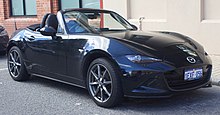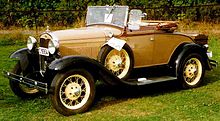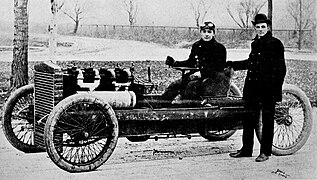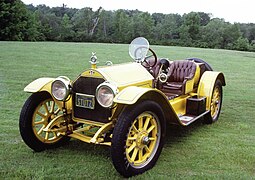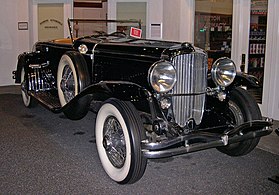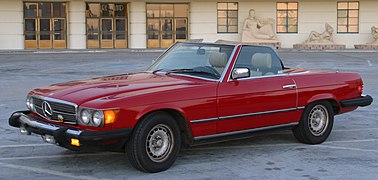Speedster (automobile)
A roadster (also spider, spyder) is an open two-seat car with emphasis on sporting appearance or character.[1][2] Initially an American term for a two-seat car with no weather protection, its usage has spread internationally and has evolved to include two-seat convertibles.
The roadster was also a style of racing car driven in United States Auto Club (USAC) Championship Racing, including the Indianapolis 500, in the 1950s and 1960s. This type of racing car was superseded by rear-mid-engine cars.
Etymology

The term "roadster" originates in the United States, where it was used in the 19th century to describe a horse suitable for travelling.[3][4] By the end of the century, the definition had expanded to include bicycles and tricycles.[5] In 1916, the United States Society of Automobile Engineers defined a roadster as: "an open car seating two or three. It may have additional seats on running boards or in rear deck."[6] Since it has a single row of seats, the main seat for the driver and passenger was usually further back in the chassis than it would have been in a touring car.[4][7]: 258 Roadsters usually had a hooded dashboard.[7]: 257
In the United Kingdom, historically, the preferred terms were "open two-seater" and "two-seat tourer".[8][9] Since the 1950s, the term "roadster" has also been increasingly used in the United Kingdom. It is noted that the optional 4-seat variant of the Morgan Roadster would not be technically considered a roadster.[citation needed]
The term "spider" or "spyder," sometimes used in names for convertible models, is said to come from before the automobile era. Some 19th-century lightweight horse-drawn phaetons had a small body and large wooden wheels with thin spokes; they were nicknamed "spiders" because of their appearance; the nickname was transferred to sports cars, although they did not look similar.[10]
In 1962, Chevrolet introduced the Monza Spyder, a turbocharged version of its Corvair compact, available as a convertible or coupe. Although not a true 2 passenger vehicle, it featured upgraded suspension and other equipment to classify it as a "sporty car."
History
Auto racing began with the first earnest contests in 1894 in Europe, and in 1895 in the United States. Some of the earliest race cars were purpose-built or stripped for the greatest speed, with minimal or no bodywork at all, leading to a body style aptly named 'speedster'. The cut-down speedster body-style really took form in the 1900s. After removing most of the body (and fenders), an empty platform on the ladder-frame chassis was mounted with one or two seats, a gas tank, and spare tyres.[11]
American manufacturers Mercer and Stutz started offering ready-made racing speedsters, intentionally built to be driven to race(-track), raced, and driven back by their owner – essentially the first track day cars.[11]
- 1890s to 1920s speedsters
-
Ransom Olds' 1896/1897 "Pirate" racer was one of the first speedsters.
-
Barney Oldfield and Henry Ford with Oldfield's 999 speedster, 1902
-
1909 model T speedster – announced winner of the 1909 Ocean to Ocean race, disqualified because of an engine change
-
1910 Mercer 35R Raceabout (1912 specimen)
-
The 1912 Stutz Bear Cat / Bearcat, (1914 shown), available doorless through 1916
The immediate predecessor to the roadster was the runabout, a body style with a single row of seats and no doors, windshield, or other weather protection. Another predecessor was the touring car, similar in body style to the modern roadster except for its multiple rows of seats. By the 1920s roadsters were appointed similarly to touring cars, with doors, windshields, simple folding tops, and side curtains.[4]
Roadster bodies were offered on automobiles of all sizes and classes, from mass-produced cars like the Ford Model T and the Austin 7 to extremely expensive cars like the Cadillac V-16, the Duesenberg Model J and Bugatti Royale.
- 1920s to 1950s roadsters
-
1926 Ford Model T roadster
-
1932 Duesenberg J Murphy-bodied roadster
-
1937 Delahaye 135MS roadster
-
1949 MG TC open two-seater marketed in USA as a roadster
By the 1970s "roadster" could be applied to any two-seater car of sporting appearance or character.[12] In response to market demand they were manufactured as well-equipped as convertibles[13] with side windows that retracted into the doors. Popular models through the 1960s and 1970s were the Alfa Romeo Spider, MGB and Triumph TR4.
- 1950s to 1980s roadsters
-
1973 MGB
-
1983 Mercedes-Benz 380SL
-
1987 Cadillac Allanté
The highest selling roadster is the Mazda MX-5, which was introduced in 1989.[14][15][16] The early style of roadster with minimal weather protection is still in production by several low-volume manufacturers and fabricators, including the windowless Morgan Roadster, the doorless Caterham 7 and the bodyless Ariel Atom.
- 1990s to present day roadsters
IndyCar roadster layout
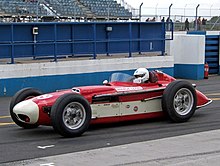
The term roadster was used to describe a style of racing cars competing in the AAA/USAC Championship Cars series (the IndyCar equivalents of the time) from 1952 to 1969. The roadster engine and drive shaft are offset from the centerline of the car. This allows the driver to sit lower in the chassis and facilitates a weight offset which is beneficial on oval tracks.[17]
One story of why this type of racing car is referred to as a "roadster" is that a team was preparing a new car for the Indianapolis 500. They had it covered in a corner of their shop. If they were asked about their car they would try and obscure its importance by saying that it was just their (hot rod) "roadster". After the Indianapolis racer was made public, the "roadster" name was still attached to it.[citation needed]
Frank Kurtis built the first roadster to race and entered it in the 1952 Indianapolis 500. It was driven by Bill Vukovich who led for most of the race until a steering failure eliminated him. The Howard Keck owned team with Vukovich driving went on to win the 1953 and 1954 contests with the same car. Bob Sweikert won the 1955 500 in a Kurtis after Vukovich was killed while leading. A. J. Watson,[18] George Salih and Quinn Epperly were other notable roadster constructors. Watson-built roadsters won in 1956, 1959 – 1964 though the 1961 and 1963 winners were actually close copies built from Watson designs. The 1957 and 1958 winner was the same car built by Salih with help by Epperly built with a unique placement of the engine in a 'lay down' mounting so the cylinders were nearly horizontal instead of vertical as traditional design dictated.[19] This gave a slightly lower center of mass and a lower profile.
Roadsters continued to race until the late 1960s, although they became increasingly uncompetitive against the new rear-engined racing cars. The last roadster to complete the full race distance was in 1965, when Gordon Johncock finished fifth in the Wienberger Homes Watson car. The last roadster to make the race was built and driven by Jim Hurtubise in the 1968 race and dropped out early.[20]
Some pavement midget roadsters were built and raced into the early 1970s but never were dominant.[21]
See also
- Barchetta, a related two-seater body style designed primarily for racing
- Convertible, the general term to describe vehicles with retractable roofs and retractable side windows
- Roadster utility
- Tonneau cover, a protective cover for the seats in an open car
References
- ^ Pollard, Elaine, ed. (1994). "R". The Oxford Paperback Dictionary (Fourth ed.). Oxford, UK: Oxford University Press. p. 692. ISBN 0-19-280012-4.
roadster noun an open car without rear seats.
- ^ Georgano, G. N., ed. (1971). "Glossary". Encyclopedia of American Automobiles. New York, NY USA: E. P. Dutton. pp. 215–217. ISBN 0-525-097929. LCCN 79147885.
Roadster. A two-passenger open car of sporting appearance.
- ^ Webster, Noah; Goodrich, Chauncey A.; Porter, Noah (1861). "Roadster". An American Dictionary of the English Language. Springfield, MA US: G. and C. Merriam. p. 959.
- ^ a b c Haajanen, Lennart W. (2003). Illustrated Dictionary of Automobile Body Styles. Illustrations by Bertil Nydén; foreword by Karl Ludvigsen. Jefferson, NC USA: McFarland. p. 113. ISBN 0-7864-1276-3. LCCN 2002014546.
- ^ Porter, Noah, ed. (1898). "Roadster". Webster's International Dictionary of the English Language. Springfield, MA US: G. and C. Merriam. p. 1246. LCCN 98001281.
- ^ Society of Automobile Engineers, Nomenclature Division (August 20, 1916). "What's What in Automobile Bodies Officially Determined" (pdf). The New York Times. New York, NY USA. Nomenclature Division, Society of Automobile Engineers. ISSN 0362-4331. OCLC 1645522. Retrieved 2012-05-31.
Here it is, with other body types and distinctions, officially determined recently by the Nomenclature Division of the Society of Automobile Engineers:
- ^ a b Clough, Albert L. (1913). A dictionary of automobile terms. The Horseless Age Company. LCCN 13003001. Retrieved 1 September 2014.
- ^ Culshaw, David; Horrobin, Peter (2013) [1974]. "Appendix 5 - Coachwork styles". The complete catalogue of British Cars 1895 - 1975 (e-book ed.). Poundbury, Dorchester, UK: Veloce Publishing. pp. 480–484. ISBN 978-1-845845-83-4.
- ^ "The Used Car Problem". Garage Organization and Management. Taylor & Francis. pp. 259–260. Retrieved 2012-10-26.
(for the purposes of this British publication) 'In order to avoid confusion, however, the universally understood terms "Tourer", "Coupé", "Saloon", "Limousine", etc., have been adopted, adding the American term 'Roadster' as the two-seater edition of the tourer.'
- ^ Silvestro, Brian (14 May 2018). "Here's Why Convertibles Are Called Spiders". Road & Track.
- ^ a b The Cutdown Speedster — ClassicSpeedsters.com
- ^ Georgano 1971, p. 216.
- ^ Culshaw & Horrobin 2013, p. 482.
- ^ "Mazda Produces 900,000th MX-5, Recognized as World's Best-Selling Sports Car". www.motortrend.com. Retrieved 23 June 2018.
- ^ "History of the Mazda MX-5 - picture special". www.autocar.co.uk. Retrieved 23 June 2018.
- ^ "25 Snapshots of the Mazda Miata Through History". www.cheatsheet.com. Retrieved 23 June 2018.
- ^ "The 10 greatest Indy roadsters in history". www.macsmotorcitygarage.com. Retrieved 28 October 2018.
- ^ "(USAC) Championship Indy Car Roadster". www.ewarbirds.org. Retrieved 28 October 2018.
- ^ "Brickyard Classic: 1958 Indy 500 – The Salih and Epperly "Laydown" Roadsters". www.curbsideclassic.com. Retrieved 28 October 2018.
- ^ "Robin Miller". www.racer.com. Retrieved 28 October 2018.
- ^ "The Don Edmunds Fully Independent Suspended Roadster Midget". www.donedmunds.com. Retrieved 14 April 2019.
External links
 Media related to Roadsters at Wikimedia Commons
Media related to Roadsters at Wikimedia Commons
